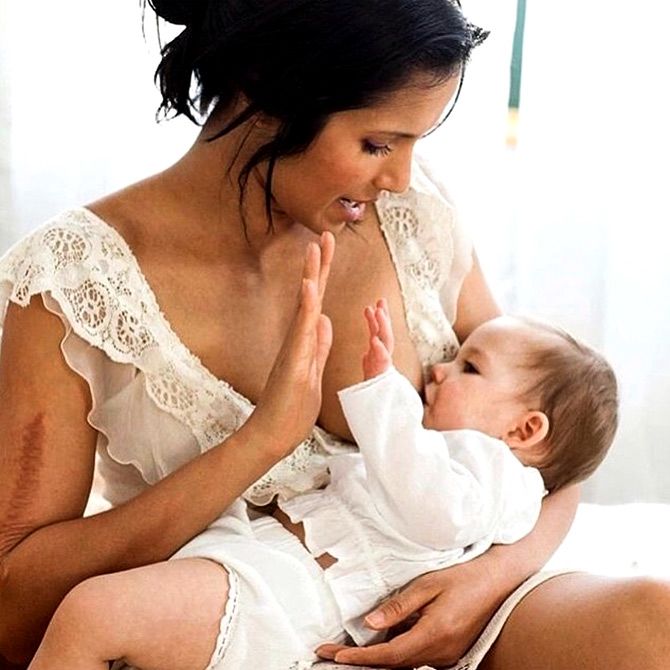Instead of going for three big meals in a day, spread out your food through six meals, suggests Dr Aruna Kalra.

Photograph: Kind courtesy Padma Lakshmi/Instagram
Pregnancy is an important event and a very special time in a woman’s life.
Nutrition is not only important for the baby but is also important for the mother’s current and future health.
Eating well during pregnancy and lactation requires a few adjustments to general good health dietary guidelines.
A woman's need for calories, proteins, vitamins, minerals and water increases after delivery as well.
Make sure you eat a healthy and balanced diet through the day.
What you must eat
Instead of going for three big meals in a day, spread out your food through six meals in a day.
Eat foods that are rich in omega-3 fatty acids, calcium, protein and fibre, such as salmon, sardines, tuna, lean meat, chicken, eggs, beans, legumes, yogurt and whole grain foods.
Oats are an excellent source of iron, calcium, fibre, carbohydrates and proteins. As they are high in fibre, they can also help keep constipation at bay.
You can also add chopped fruits like bananas and apples to increase its nutritional value.
Drinking water and fluids will also prevent dehydration and improve your metabolism, which is also effective in managing weight.
You can include different types of liquids in your daily diet such as milkshakes, lassi, soups, coconut water, fresh juices etc.
Include both healthy and delicious food items in your snack menu, such as nuts, chopped fruits, whole grains, roasted sweet potatoes, yogurt mixes and such.
Almonds are rich in carbohydrates, fibre and vitamin B12 and contain minerals like magnesium, copper, potassium, calcium and zinc.
As there are so many nutrients filled into an almond, it's an ideal food to have after delivery.
Healthy balanced diet helps the mother to have energy throughout day.
It is important to spread food throughout the day so that you get an even amount of calories. This will give you lasting power to take care of your baby and yourself, and also come to your pre-conception weight early.
What to avoid
Cut down foods which are high in calories like full cream milk, butter, ghee, dried fruits and sugar. This will help for weight loss after delivery.
Avoid eating junk food and try to eat at home as much as you can. Restrict bread, biscuits and maida products.
Avoid consuming cold aerated drinks as it can produce gas.
Try and bring up your dinner time to late evening instead of night. If you have to stay awake till late, go for a glass of milk or a cup of green tea.
Exercise
It is also important to include some form of exercise in your daily routine. Some exercises you could try are walking, jogging, swimming, aerobics, yoga and the like.
Your diet chart
While planning your diet for the day, make sure to include these five key ingredients
Whole Wheat Products
Include cereals like bran like dalia, ragi, whole wheat oats.
Fruits and Vegetables
Try to make your day colourful with 5-6 servings of vegetables and fruits daily. Have blueberries, oranges and apples.
Power packed green leafy vegetables are rich sources of iron, folic acid, vitamin A, vitamin C, calcium as well as fibre and plant antioxidants.
Consider eating, beans, lotus stem, fenugreek leaves, apple gourd (tinda), pointed gourd (parwal) or other such green seasonal vegetables.
Nuts and seeds
Include almonds, walnuts, dates, figs and mix seeds in your daily diet.
Dairy Products
Dairy products provide calcium and protein so include them liberally in your diet.
Include low-fat milk, butter milk, yoghurt into your post delivery diet.
Healthy fat
Include 5-6 tsp of healthy fat in daily diet as it provides satiety.

The author Dr Aruna Kalra is gynaecologist and obstetrics surgeon at CK Birla Hospital, Gurugram.










